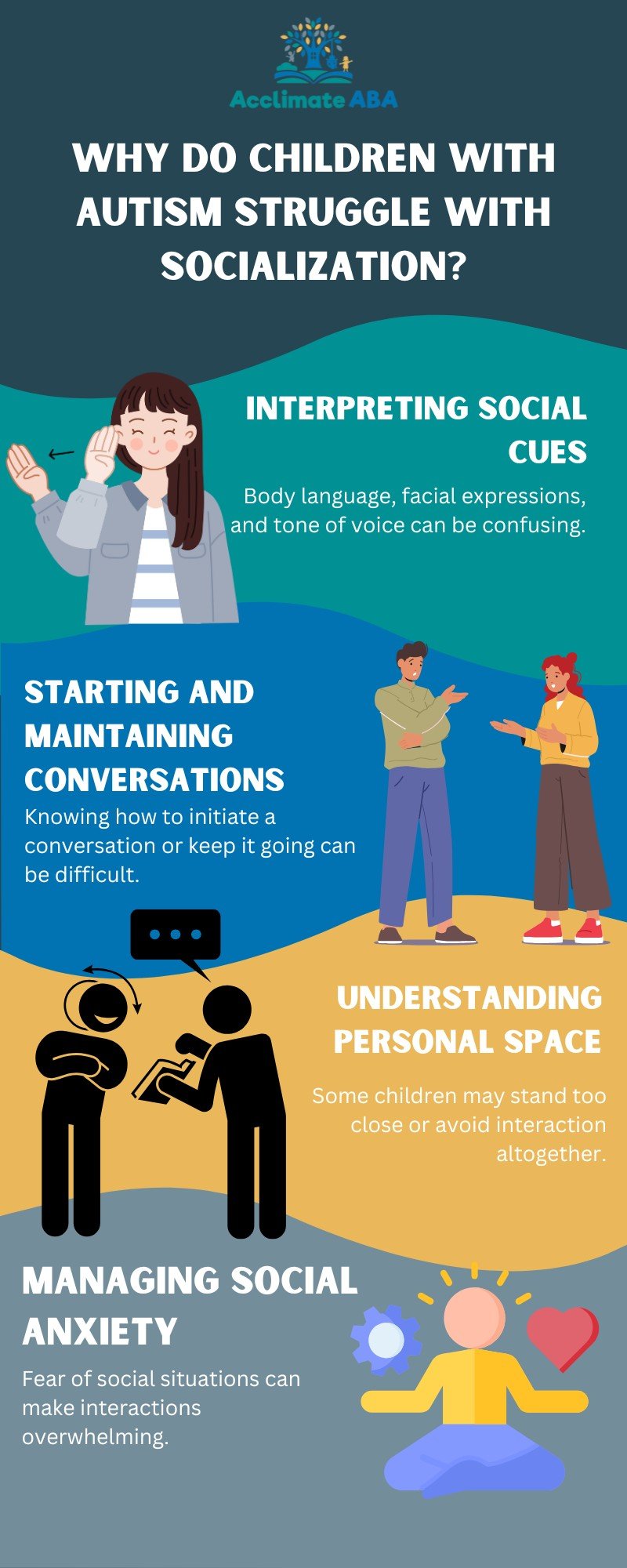How to Boost Social Skills for Kids with Autism
 Key Points:
Key Points:
- Socialization can be challenging for children with autism, but targeted strategies can help improve communication and interaction skills.
- Techniques like social stories, peer modeling, and structured play support social skill development.
- ABA therapy provides individualized support to help children navigate social situations more effectively.
Social skills aren’t just about making friends—they’re essential for everyday life. For children with autism, social interactions can feel overwhelming or confusing. Whether it’s learning how to start conversations or read emotions, there are ways to make socialization easier, helping children feel more comfortable and engaged with those around them.

These challenges vary from child to child, but structured support can help develop stronger social skills over time.
How Can Socialization Be Improved for Children with Autism
Socialization in autism can be improved through structured strategies that focus on communication, peer interactions, and real-world practice. Techniques like social stories, role-playing, and behavioral interventions help children understand and engage in social settings. Consistent reinforcement and individualized approaches are key to success.
How Can Social Stories Help with Socialization?
Social stories are short, personalized narratives that teach children how to navigate different social situations. They outline expectations and appropriate behaviors in a clear, visual format.
To use social stories effectively:
- Choose a Specific Situation – Focus on one scenario, like greeting a friend or taking turns.
- Describe the Expected Behavior – Use simple language and images to illustrate what should happen.
- Review and Practice Regularly – Read the story before the situation occurs and discuss the expected responses.
Social stories help children with autism prepare for real-world interactions, making them feel more confident in social settings.
How Can Parents Encourage Social Development at Home
Social skills development doesn’t just happen in therapy or school—it starts at home. Parents play a crucial role in reinforcing positive social behaviors through everyday interactions.
Ways to encourage social growth at home:
- Practice Conversations – Role-play common social interactions like ordering food or greeting a friend.
- Encourage Playdates – Arrange structured play opportunities with understanding peers.
- Teach Turn-Taking – Play board games or activities that require taking turns to reinforce patience and cooperation.
- Use Everyday Moments – Grocery shopping, family gatherings, or park visits provide real-world social practice.
When parents create a safe and structured environment for social learning, children feel more comfortable applying these skills in daily life. For practical strategies, check out our article on How to Teach Turn-Taking to Children with Autism.
What Role Does Peer Modeling Play?
Observing and imitating peers is an essential part of learning social skills. Peer modeling provides real-life examples of appropriate social behavior, helping children with autism understand how to interact.
Effective peer modeling strategies include:
- Playgroups with Neurotypical Peers – Encourages natural social interactions.
- Video Modeling – Watching recorded interactions and practicing the behaviors.
- Group Activities – Structured games or collaborative tasks that promote teamwork.
By seeing social behaviors in action, children can practice and internalize these skills in a supportive setting.
How Can Visual Supports Aid Socialization
Many children with autism process information more effectively through visual cues. Visual supports help them understand expectations and navigate social situations.
Common visual tools include:
- Picture Exchange Communication System (PECS) – Helps children communicate needs and desires
- Visual Schedules – Outlines daily activities, reducing anxiety around social interactions
- Emotion Charts – Helps children identify their own emotions and recognize them in others
By incorporating visual supports, parents and educators can make social expectations clearer and reduce frustration for children with autism.
How Can Structured Play Improve Social Skills
Structured play provides clear guidelines for interaction, making it easier for children with autism to engage with peers. Unlike free play, which can be overwhelming, structured activities offer predictable rules and expectations.
Examples of structured play activities:
- Cooperative Games – Games that require teamwork, such as building a puzzle together.
- Imaginative Play – Acting out social scenarios with toys or role-playing.
- Sports and Group Activities – Activities like soccer or dance classes that encourage social participation.
Structured play provides children with repeated opportunities to practice social engagement in a controlled setting.
How Does ABA Therapy Support Social Development?
Applied Behavior Analysis (ABA) therapy is one of the most effective approaches for improving social skills in children with autism. ABA therapists use evidence-based strategies to teach and reinforce positive social behaviors.
Key ways ABA therapy supports socialization:
- Breaking Down Social Skills – Teaching skills step by step, such as making eye contact or asking questions.
- Reinforcing Positive Behaviors – Rewarding successful interactions to encourage repetition.
- Practicing Real-Life Scenarios – Using role-playing and guided peer interactions to build confidence.
Discover how ABA therapy supports children with autism in building meaningful social skills, helping them form stronger relationships and better navigate social environments. Read more in our article, Exploring the Lovaas Method in ABA Therapy for Autism.
Build Social Confidence with ABA Therapy in Utah
Improving socialization in children with autism takes time, patience, and the right strategies. While parents can encourage social growth at home, professional support provides structured learning that accelerates progress. ABA therapy is a highly effective approach that helps children develop communication skills, engage with peers, and build meaningful relationships.
At Acclimate ABA, we specialize in providing individualized ABA therapy in Utah, focusing on social skill development. Our experienced therapists work closely with families to create personalized programs that help children thrive in social settings.
If you’re looking for expert guidance in helping your child improve socialization and communication, contact us today to learn more about our ABA therapy services in Utah.

